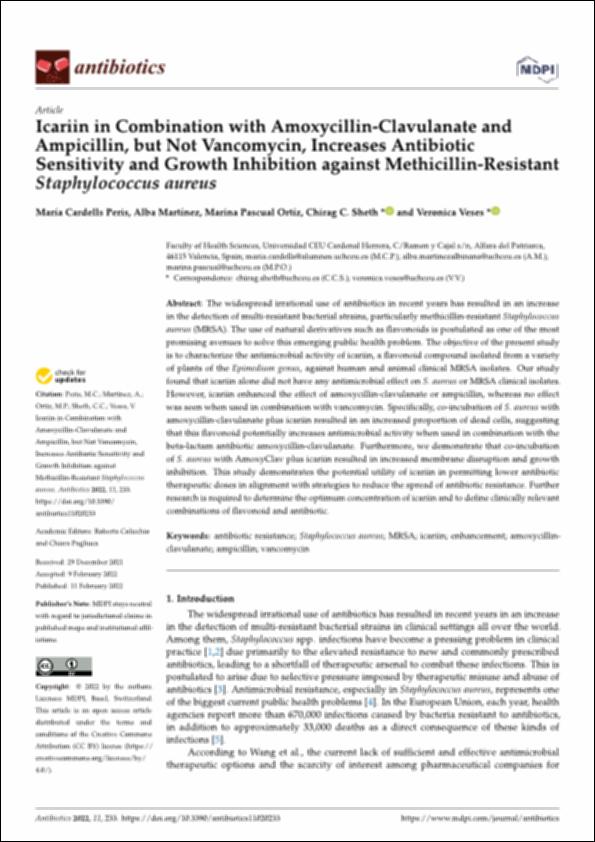Please use this identifier to cite or link to this item:
http://hdl.handle.net/10637/14161Icariin in combination with amoxycillin-clavulanate and ampicillin, but not vancomycin, increases antibiotic sensitivity and growth inhibition against methicillin-resistant "Staphylococcus aureus"
| Title: | Icariin in combination with amoxycillin-clavulanate and ampicillin, but not vancomycin, increases antibiotic sensitivity and growth inhibition against methicillin-resistant "Staphylococcus aureus" |
| Authors : | Cardells Peris, María Martinez Albiñana, Alba Pascual Ortiz, Marina Sheth Shah, Chirag Chandrakant Veses Jiménez, Verónica. |
| Keywords: | Flavonoids - Therapeutic use.; Estafilococos - Resistencia a los medicamentos.; Flavonoides - Uso terapéutico.; Antibióticos.; Icariin - Therapeutic use.; Icariin - Uso terapéutico.; Bacterias - Resistencia a los medicamentos.; Drug resistance in bacteria.; Drug resistance in Staphylococcus.; Antibiotics. |
| Publisher: | MDPI |
| Citation: | Peris, M. C., Martínez, A., Ortíz, M. P., Sheth, C. C. & Veses, V. (2022). Icariin in combination with Amoxycillin-Clavulanate and Ampicillin, but not Vancomycin, increases antibiotic sensitivity and growth inhibition against Methicillin-resistant "Staphylococcus aureus". Antibiotics, vol. 11, i. 2 (11 feb.), art. 233. DOI: https://doi.org/10.3390/antibiotics11020233 |
| Abstract: | The widespread irrational use of antibiotics in recent years has resulted in an increase in the detection of multi-resistant bacterial strains, particularly methicillin-resistant Staphylococcus aureus (MRSA). The use of natural derivatives such as flavonoids is postulated as one of the most promising avenues to solve this emerging public health problem. The objective of the present study is to characterize the antimicrobial activity of icariin, a flavonoid compound isolated from a variety of plants of the Epimedium genus, against human and animal clinical MRSA isolates. Our study found that icariin alone did not have any antimicrobial effect on S. aureus or MRSA clinical isolates. However, icariin enhanced the effect of amoxycillin-clavulanate or ampicillin, whereas no effect was seen when used in combination with vancomycin. Specifically, co-incubation of S. aureus with amoxycillin-clavulanate plus icariin resulted in an increased proportion of dead cells, suggesting that this flavonoid potentially increases antimicrobial activity when used in combination with the beta-lactam antibiotic amoxycillin-clavulanate. Furthermore, we demonstrate that co-incubation of S. aureus with AmoxyClav plus icariin resulted in increased membrane disruption and growth inhibition. This study demonstrates the potential utility of icariin in permitting lower antibiotic therapeutic doses in alignment with strategies to reduce the spread of antibiotic resistance. Further research is required to determine the optimum concentration of icariin and to define clinically relevant combinations of flavonoid and antibiotic. |
| Description: | Este artículo se encuentra disponible en la siguiente URL: https://www.mdpi.com/2079-6382/11/2/233 Este artículo de investigación pertenece al número especial "Phytocompounds with Antimicrobial Activity: From Discovery to Application". |
| URI: | http://hdl.handle.net/10637/14161 |
| Rights : | http://creativecommons.org/licenses/by/4.0/deed.es |
| ISSN: | 2079-6382 (Electrónico) |
| Language: | es |
| Issue Date: | 11-Feb-2022 |
| Center : | Universidad Cardenal Herrera-CEU |
| Appears in Collections: | Dpto. Ciencias Biomédicas |
Items in DSpace are protected by copyright, with all rights reserved, unless otherwise indicated.


